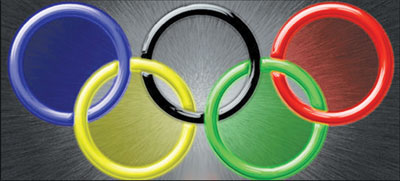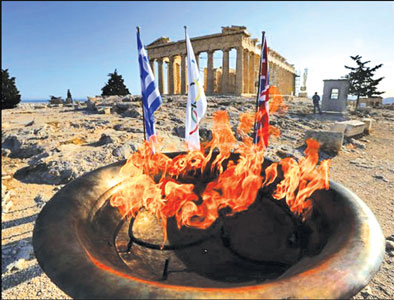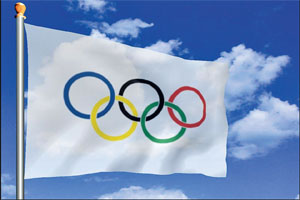|
Olympics:
How the Games started...

The entire world is getting ready for the Olympic Games which will be
held in London, England from July 27 to August 12. Last week we featured
about the traditional Olympic Torch Relay which is presently winding its
way to the London stadium to mark the beginning of the Games. Just like
the Olympic flame which burns brightly in the torch as it travels from
one town to the other, the flame of hope burns brightly in the hearts of
the thousands of athletes who are eagerly waiting for the Games to get
off the ground. As the torchbearers and athletes march forward to usher
in the spectacular opening ceremony let's step back in time to trace how
the Games originated, and also how many things associated with the Games
today came about.
There are many legends connected with the origin of the Olympic Games
which has become the greatest sporting event in the world that brings
together athletes from all over the world. While one legend claims
ancient Olympic Games were founded by Heracles (Hercules), a son of Zeus
who brought a sacred olive tree to Olympia, an alternative myth has the
hero Pelops (from which the name of the Peloponnese region of Greece
originates) established the festival after defeating King Oenomaus in a
chariot race.
  Whatever
the precise origin of the Games, they became a central aspect of Greek
culture. The Games were held every fourth year, with the four year span
being called an Olympiad. Whatever
the precise origin of the Games, they became a central aspect of Greek
culture. The Games were held every fourth year, with the four year span
being called an Olympiad.
The first Olympic Games for which there are written records, were
held in 776 BCE. However, it is believed the Games were held even before
this. Athletes competed in the Games as individuals, not as members of a
national or city-state team. At first most competitors were drawn from
the wealthiest, aristocratic class of Greeks since the time required for
training precluded participation in everyday work.
As time went on the Olympics became less exclusive, and poorer
athletes were able to find 'sponsorship' in order that they might also
compete. Do you know that participants in the early Games were all
males? No women were allowed to even be spectators, and the penalty, if
they were caught, was to be thrown off a nearby cliff!
The ancient Olympic Games grew and continued to be played every four
years for nearly 1,200 years. However, there was a break in the Games
when in 393 CE, the Roman emperor Theodosius I, a Christian, abolished
the Games because of their pagan influences. Approximately 1,500 years
later, a young Frenchmen named Pierre de Coubertin began their revival.
Coubertin was a French aristocrat born on January 1, 1863. He was
only seven years old when France was overrun by the Germans during the
Franco-Prussian War of 1870. Some believe that Coubertin attributed the
defeat of France not to its military skills but rather to the French
soldiers' lack of vigour. After examining the education of the German,
British, and American children, Coubertin decided that it was exercise,
more specifically sports, that made a well-rounded and vigorous person.
Coubertin's attempt to get France interested in sports was not met
with enthusiasm. Still, Coubertin persisted. In 1890, he organised and
founded a sports organisation, Union des Sociétés Francaises de Sports
Athlétiques (USFSA).
Two years later, Coubertin first pitched his idea to revive the
Olympic Games. At a meeting of the Union des Sports Athlétiques in Paris
on November 25, 1892, Coubertin stated, "Let us export our oarsmen, our
runners, our fencers into other lands. That is the true Free Trade of
the future; and the day it is introduced into Europe the cause of Peace
will have received a new and strong ally.
"It inspires me to touch upon another step I now propose and in it I
shall ask that the help you have given me hitherto you will extend
again, so that together we may attempt to realise, upon a basis suitable
to the conditions of our modern life, the splendid and beneficent task
of reviving the Olympic Games".
Though Coubertin was not the first to propose the revival of the
Olympic Games, he was certainly the most well-connected and persistent
of those to do so. Two years later, Coubertin organised a meeting with
79 delegates who represented nine countries. He gathered these delegates
in an auditorium that was decorated by neoclassical murals and similar
additional points of ambience. At this meeting, Coubertin eloquently
spoke of the revival of the Olympic Games. This time, Coubertin aroused
interest. The delegates at the conference voted unanimously for the
Olympic Games. The delegates also decided to have Coubertin construct an
international committee to organise the Games.
This committee became the International Olympic Committee (IOC;
Comité Internationale Olympique) and Demetrious Vikelas from Greece was
selected to be its first president. Athens was chosen as the location
for the revival of the Olympic Games and the planning was begun. From
then on the modern Olympic Games were held with the very first one
taking place in Athens, Greece in 1896 and later in various other
countries.
Facts and pix: Internet
 The
official Olympic flag The
official Olympic flag
Created by Pierre de Coubertin in 1914, the Olympic flag contains
five interconnected rings on a white background. The five rings
symbolise the five significant continents and are interconnected to
symbolise the friendship to be gained from these international
competitions. The rings, from left to right, are blue, yellow, black,
green, and red.
The colours were chosen because at least one of them
appeared on the flag of every country in the world. The Olympic flag was
first flown during the 1920 Olympic Games.
The motto
In 1921, Pierre de Coubertin borrowed a Latin phrase from his friend,
Father Henri Didon, for the Olympic motto: Citius, Altius, Fortius
("Swifter, Higher, Stronger").
The oath
An oath for the athletes to recite at each Olympic Games was also
written by Pierre de Coubertin. During the opening ceremonies, one
athlete recites the oath on behalf of all the athletes. The Olympic oath
was first taken during the 1920 Olympic Games by Belgian fencer Victor
Boin. The Olympic Oath states,
"In the name of all competitors, I promise that we shall take part in
these Olympic Games, respecting and abiding by the rules that govern
them, in the true spirit of sportsmanship, for the glory of sport and
the honour of our teams."
The creed
Pierre de Coubertin got the idea for the creed from a speech given by
Bishop Ethelbert Talbot at a service for Olympic champions during the
1908 Olympic Games. The Olympic Creed reads:"The most important thing in
the Olympic Games is not to win but to take part, just as the most
important thing in life is not the triumph but the struggle. The
essential thing is not to have conquered but to have fought well."
The flame
The Olympic flame is a practice continued from the ancient Olympic
Games. In Olympia (Greece), a flame was ignited by the sun and then kept
burning until the closing of the Olympic Games. The flame first appeared
in the modern Olympics at the 1928 Olympic Games in Amsterdam. The flame
itself represents a number of things, including purity and the endeavour
for perfection. In 1936, the chairman of the organising committee for
the 1936 Olympic Games, Carl Diem, suggested what is now the modern
Olympic Torch relay. The Olympic flame is lit at the ancient site of
Olympia by women wearing ancient-style robes and using a curved mirror
and the sun. The Olympic Torch is then passed from runner to runner from
the ancient site of Olympia to the Olympic stadium in the hosting city.
The flame is then kept alight until the Games have concluded. The
Olympic Torch relay represents a continuation from the ancient Olympic
Games to the modern Olympics.
The hymn
The Olympic hymn, played when the Olympic flag is raised, was
composed by Spyros Samaras and the words added by Kostis Palamas. The
Olympic hymn was first played at the 1896 Olympic Games in Athens but
wasn't declared the official hymn by the IOC until 1957.
The medals
The Olympic medals are designed especially for each individual
Olympic Games by the host city's organising committee. Each medal must
be at least three millimetre thick and 60 millimetre in diametre. Also,
the gold and silver Olympic medals must be made out of 92.5 percent
silver, with the gold medal covered in six grams of gold.
The last Olympic gold medals that were made entirely out of gold were
awarded in 1912.
Opening ceremony procession order
During the opening ceremony of the Olympic Games, the procession of
athletes is always led by the Greek team, followed by all the other
teams in alphabetical order (in the language of the hosting country),
except for the last team which is always the team of the hosting
country.
[Fast facts]
* The pentathlon was the event from which the modern Olympics derives
many of its events, including the discus, javelin, long jump, running
and wrestling.
*. At the first Olympic Games, a runner, Coroebus (a cook from Elis),
won the sole event, the stade - a run of approximately 192 metres (210
yards). This made Coroebus the very first Olympic champion in history.
* Boxing was fought without rounds until one side was either knocked
out or admitted defeat. There were no weight divisions, and opponents
were selected by random lot. Boxers did not wear gloves, but instead
wore himantes, pieces of leather tied around the hands and wrists
leaving the fingers free.
* Chariot racing was a sport that only the wealthiest contestants
could take part in since the cost of maintaining a chariot was
prohibitively expensive. Chariot racers competed in various courses,
some of which involved potentially lethal obstacles.
* Horse racing was divided into separate competitions for adult
horses and foals. They took place away from the athletic stadium in a
large arena called the hippodrome. Stirrups were not used and the usual
distance run was 1200 meters.
* Pankration was a form of single combat that combined boxing,
wrestling and judo. The only banned moves were biting and gouging the
eyes, nose or mouth with fingernails.
* Running was organised into several events. Chief among them was the
stadion, which was a 192 metre sprint the length of the stadium, though
there were also distance running competitions.
* Wrestling required three throws of one's opponent. Biting was not
allowed , but breaking an opponents' fingers was acceptable.
* The first opening ceremonies were held during the 1908 Olympic
Games in London.
* James B. Connolly (United States), winner of the hop, step, and
jump (the first final event in the 1896 Olympics), was the first Olympic
champion of the modern Olympic Games.
*In 490 BCE, Pheidippides, a Greek soldier, ran from Marathon to
Athens (about 25 miles) to inform the Athenians the outcome of the
battle with invading Persians. The distance was filled with hills and
other obstacles; thus Pheidippides arrived in Athens exhausted and with
bleeding feet. After telling the townspeople of the Greeks' success in
the battle, Pheidippides fell to the ground dead.
In 1896, at the first modern Olympic Games, held a race of
approximately the same length in commemoration of Pheidippides. |

